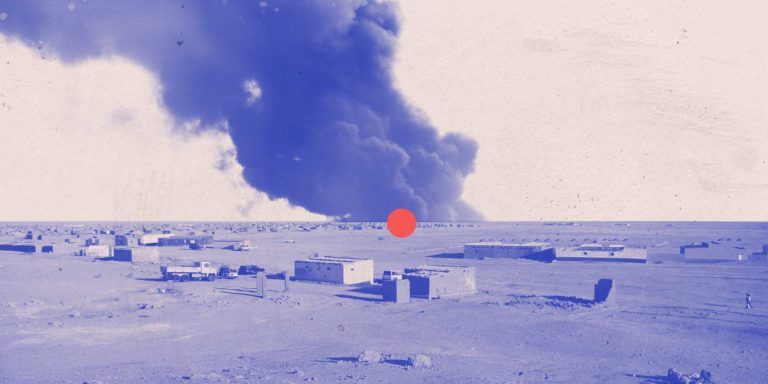More than 12 million people in Syria and Iraq are losing access to water, food and electricity. This is the shocking conclusion of a report issued by the Norwegian Refugee Council (NRC), warning that rising temperatures, lower levels of rainfall and drought are depriving residents across the region of drinking water and water for irrigation and public services such as healthcare and electricity.
Power generation has been disrupted due to reservoirs running out of water. According to the report more than 5 million people in Syria depend directly on the Euphrates River, while the Tishreen and Euphrates Lakes supply some 5 million people with electricity. Both are threatened with closure.
“I am burdened with debt…Because of the drought, I was not able to harvest any wheat.”
Communities in Hasakah, Aleppo, Raqqa and Deir el-Zor, in addition to the many displaced living in camps, have witnessed an increase in waterborne diseases as a consequence of the drop in water levels in rivers and lakes. The village of Sibat, some 30 kilometer north of Hasakah, witnessed an exodus of dozens of villagers due to drought, according to local residents.
“This year we witnessed a severe drought and as a result our lands did not produce any crops, nor did we have enough water for our livestock,” a tribal sheikh told the report’s authors. “To think that the current conditions will force us to leave our rural areas and lands is infuriating.” “


For the first time in history, the water level in the Euphrates River in Syria decreased by more than 5 meters, which led to many irrigation stations and power plants being suspended. Also, the reduced water flow from Turkey has led to a state of unprecedented environmental deterioration. Images published by environmental activists and local media show large parts of the river having dried up, which puts a heavy burden on the lives and agriculture activities of the residents in the region.
The Syrian Observatory for Human Rights monitored the drought along the Euphrates River, which extends from the Euphrates Dam in Tabqa to the Mansoura Dam in Raqqa. According to Syrian data, Turkey has reduced the water flowing by more than half, as a consequence of the many dams it built on the international river, specifically the giant Ataturk Dam. This despite the agreement signed between the two countries, which stipulates that the water of the Euphrates River reaching Syria should amount to 500 cubic meters per second. Yet, the water flow currently does not exceed 200 cubic meters per second. As a consequence, a human and environmental catastrophe is unfolding, which can only be halted if international organizations are willing to intervene. And it is not just Syria that is affected.
In Iraq, severe shortage of Euphrates water threatens some 7 million people and has put some 400 square kilometer of agricultural lands at risk of being lost to drought. Fisheries and power generation facilities too are at risk of being lost. Many families in Anbar province, which depends on Euphrates water, currently spend about $80 per month to buy potable water. The decrease in the flow of Euphrates water could furthermore destroy the unique marshlands of south Iraq, which are protected as a UNESCO World Heritage Site.
But water scarcity is not only due to the reduced flow of the Euphrates River. Wheat production in the Nineveh Governorate is expected to fall by 17 percent due to drought. In the governorates of the Kurdistan region production is expected to drop by half. Many farmers have been forced to spend their savings and borrow money to maintain their livestock and secure their livelihoods in Nineveh. “I am burdened with debt,” said Hamid Ali, a farmer from Al-Baaj, one of the areas worst affected by the drought in the Nineveh Plain. “Because of the drought, I was not able to harvest any wheat.”
“To think that the current conditions will force us to leave our rural areas and lands is infuriating.”
“The total collapse of water and food production for millions of Syrians and Iraqis is imminent,” said NRC regional director Karsten Hansen. He emphasized that the current water crisis, in combination with the ongoing displacement of hundreds of thousands of Iraqis, and the flight of Syrians in search of survival, will soon turn into an unprecedented disaster, and cause more and more people to become displaced.
“The situation requires rapid action from the regional authorities and donor governments to face this crisis, as well as the existing conflicts, the Covid-19 pandemic and the severe economic decline,” said Nirvana Shawky, CARE Regional Director for the Middle East and North Africa. “People will need to invest in sustainable solutions to the water and food crisis, in a way that can benefit them in the long term.”
“The water crisis will inevitably worsen, and conflict is likely to intensify in the region, which is already suffering from instability,” said Jerry Garvey, Regional Director of the Danish Refugee Council in the Middle East. “We have no time to waste. We must find sustainable solutions and provide water and food for present and future generations.”
Read Also:







